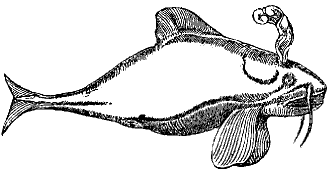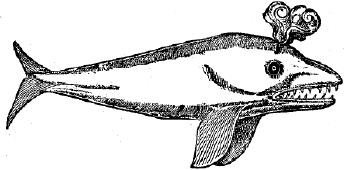Chap. XXVI[1]
Of Sperma-Ceti, and the Sperma-Ceti Whale.
WHAT Sperma-Ceti is, men might justly doubt, since the learned Hofmanus in his work of Thirty years,2 saith plainly, Nescio quid sit. And therefore need not wonder at the variety of opinions; while some conceived it to be flos maris, and many, a bituminous substance floating upon the sea.
That it was not the spawn of the Whale, according to vulgar conceit, or nominal appellation Phylosophers have always doubted: not easily conceiving the Seminal humour of Animals, should be inflamable; or of a floating nature.
That it proceedeth from a Whale, beside the relation of Clusius and other learned observers, was indubitably determined, not many years since by a Sperma-Ceti Whale, cast on our coast of Norfolk.3 Which, to lead on further inquiry, we cannot omit to inform. It contained no less then sixty foot in length, the head somewhat peculiar, with a large prominency over the mouth; teeth only in the lower Jaw, received into fleshly sockets in the upper. The Weight of the largest about two pound: No gristly substances in the mouth, commonly called Whale-bones; Only two short finns seated forwardly on the back; the eyes but small, the pizell large, and prominent. A lesser Whale of this kind above twenty years ago, was cast upon the same shore.4
The description of this Whale seems omitted by Gesner, Rondeletius, and the first Editions of Aldrovandus; but described in the Latin impression of Pareus, in the Exoticks of Clusius, and the natural history of Nirembergius; but more amply in Icons and figures of Johnstonus.
Mariners (who are not the best Nomenclators) called it a Jubartus, or rather Gibbartas. Of the same appellation we meet with one in Rondeletius, called by the French Gibbar, from its round and Gibbous back.[5] The name Gibbarta we find also given unto one kind of Greenland Whales: But this of ours seemed not to answer the Whale of that denomination; but was more agreeable unto the Trumpa or Sperma-Ceti Whale: according to the account of our Greenland describers in Purchas. And maketh the third among the eight remarkable Whales of that Coast.
Out of the head of this Whale, having been dead divers days, and under putrifaction, flowed streams of oyl and Sperma-Ceti; which was carefully taken up and preserved by the Coasters. But upon breaking up, the Magazin of Sperma-Ceti, was found in the head lying in folds and courses, in the bigness of goose eggs, encompassed with large flaxie substances, as large as a mans head, in form of hony-combs, very white and full of oyl.
Some resemblance or trace hereof there seems to be in the Physiter or Capidolio of Rondeletius;[6] while he delivers, that a fatness more liquid then oyl, runs from the brain of that animal; which being out, the Reliques are like the scales of Sardinos pressed into a mass; which melting with heat, are again concreted by cold. And this many conceive to have been the fish which swallowed Jonas.[7] Although for the largeness of the mouth, and frequency in those seas, it may possibly be the Lamia.
Some part of the Sperma-Ceti found on the shore was pure, and needed little depuration; a great part mixed with fetid oyl, needing good preparation, and frequent expression, to bring it to a flakie constituency. And not only the head, but other parts contained it. For the carnous parts being roasted, the oyl dropped out, an axungious and thicker part subsiding; the oyl it self contained also much in it, and still after many years some is obtained from it.
Greenland Enquirers seldom meet with a Whale of this kind: and therefore it is but a contingent Commodity, not reparable from any other. It flameth white and candent like Camphire, but dissolveth not in aqua fortis, like it. Some lumps containing about two ounces, kept ever since in water, afford a fresh, and flosculous smell. Well prepared and separated from the oyl, it is of a substance unlikely to decay, and may out last the oyl required in the Composition of Mathiolus.
Of the large quantity of oyl, what first came forth by expression from the Sperma-Ceti, grew very white and clear, like that of Almonds or Ben. What came by decoction was red. It was found to spend much in the vessels which contained it: It freezeth or coagulateth quickly with cold, and the newer soonest. It seems different from the oyl of any other animal, and very much frustrated the expectation of our soap-boylers, as not incorporating or mingling with their lyes. But it mixeth well with painting Colours, though hardly drieth at all. Combers of wooll made use hereof, and Country people for cuts, aches and hard tumours. It may prove of good Medical use; and serve for a ground in compounded oyls and Balsams. Distilled, it affords a strong oyl, with a quick and piercing water. Upon Evaporation it gives a balsame, which is better performed with Turpentine distilled with Sperma-Ceti.
Had the abominable scent permitted, enquiry had been made into that strange composure of the head, and hillock of flesh about it. Since the Work-men affirmed, they met with Sperma-Ceti before they came to the bone, and the head yet preserved, seems to confirm the same. The Sphincters inserving unto the Fistula or spout, might have been examined, since they are so notably contrived in other cetaceous Animals; as also the Larynx or Throtle, whether answerable unto that of Dolphins and Porposes in the strange composure and figure which it maketh. What figure the stomack maintained in this Animal of one jaw of teeth, since in Porposes, which abound in both, the ventricle is trebly divided, and since in that formerly taken nothing was found but Weeds and a Loligo. The heart, lungs, and kidneys, had not escaped; wherein are remarkable differences from Animals of the land, likewise what humor the bladder contained, but especially the seminal parts, which might have determined the difference of that humor, from this which beareth its name.
In vain it was to rake for Ambergreece in the panch of this Leviathan, as Greenland discovers, and attests of experience dictate, that they sometimes swallow great lumps thereof in the Sea; insufferable fetour denying that enquiry. And yet if, as Paracelsus encourageth, Ordure makes the best Musk, and from the most fetid substances may be drawn the most odoriferous Essences; all that had not Vespasians Nose,8 might boldly swear, here was a subject fit for such extractions.
NOTES
* [My or others' notes are in square brackets]; Browne's marginalia is unmarked; {passages or notes from unpublished material by Browne is in curly braces}.
1 [Added in the 3rd (1658) edition; the chapter is probably best known from its association with Melville and Moby-Dick.]
2 De medicamentis officin.
3 Near Wells.
4 Near Hunstanton.
5 [Thus Rondelet (1554) Libri de piscibus marinis, XVI.12 (p. 482), "eam [balaenam] Santones beluarum piscatores vocant gibbar, à gibbero dorso, id est, in tumorem elevato, in quo est pinna."]

Rondelet's "Balaena vera"
6 [Rondelet, p. 485: "peis mular", "capidolio", or "sedenette".]

Rondelet's "Physeter" or "Capidolio"
7 [Although discredited by most commentators, the identity of Jonah's fish as a whale was in the seventeenth century, as now, widespread; in fact, a pamphlet of 1645 combines anti-Catholicism with the idea: "A great Miracle at Sea: Or, A perfect Relation of a mighty Whale, which was pursued in the Sea, and encounterd by multitudes of other Fishes ... [and] was found dead upon the Shore within three miles of Weymouth. Where the Countrey people (after many dayes labour upon this might fish) having opened it's belly, found a Romish Priest, with a black Box of Pardons from the Pope for many Papists in England and Ireland, whose Names are here printed". The title is pretty much the complete contents in a nutshell, with the addition that the author claims that the pursuit of the Whale by all those fish prove that "Antichrist or Pope ... is odious not onely to men and Creatures upon earth, but even to Fishes in the Sea". (For good measure, the Priest was dead.) And with really good, meaty stuff (like this pamphlet) just waiting to be taken up, thinking of all those anti-Catholic sites out there giving us the same old tripe over and over again, well, it just makes your heart ache.]
8 Cui suavis odor lucri ex re qualibet. [After Juvenal XIV 204-205.]
This page is dedicated to the memory of Boo the Cat.
